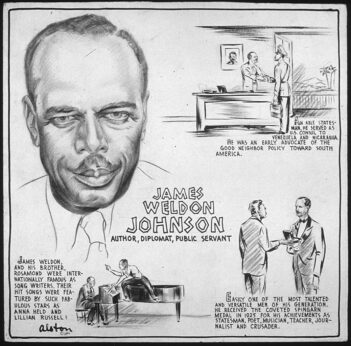
On Feb. 12, 1900, the students of the segregated Stanton School in Jacksonville, Fla., where James Weldon Johnson (1871-1938)—the poet and novelist who would go on to become the executive secretary of the NAACP—was the principal, gave the first ever performance of “Lift Every Voice and Sing,” the song that would become known as the Black national anthem, as part of a celebration of President Abraham Lincoln’s birthday.

“My brother, J. Rosamond Johnson, and I decided to write a song to be sung at the exercise,” Johnson wrote in 1935.
“I wrote the words and he wrote the music. Our New York publisher, Edward B. Marks, made mimeographed copies for us, and the song was taught to and sung by a chorus of five hundred colored schoolchildren.
“Shortly afterwards my brother and I moved from Jacksonville to New York, and the song passed out of our minds. But the school children of Jacksonville kept singing it, they went off to other schools and sang it, and they became teachers and taught it to other children. Within twenty years it was being sung over the South and in some other parts of the country. Today, the song, popularly known as the Negro National Hymn, is quite generally used.
“The lines of this song repay me in an elation, almost of exquisite anguish, whenever I hear them sung by Negro children.”
As Johnson intimates, the song quickly spread after its original performance. It was endorsed by Booker T. Washington in 1905 and became the official song of the NAACP in 1919. Since then, it has remained a beloved cultural touchstone, sung in schools, stadiums, and churches across the country, and performed by everyone from Kim Weston to Gladys Knight to Beyoncé.
“What are we to do with the ugliness that comes with loving a country with soil rich from the bloodshed of those who shoulder the trauma of its creation—from the pillaging of the land to the enslaved bodies that toiled atop it?” wrote Gerrick Kennedy in Didn’t We Almost Have It All. “The answer for Black people was to make their own anthem, and that’s why for the last century ‘Lift Every Voice and Sing’ has been our rallying cry for liberation and a lasting symbol of Black pride.”
Lift every voice and sing
Till earth and heaven ring
Ring with the harmonies of Liberty
Let our rejoicing rise
High as the listening skies
Let it resound loud as the rolling sea
Sing a song full of the faith that the dark past has taught us
Sing a song full of the hope that the present has brought us
Facing the rising sun of our new day begun
Let us march on till victory is won.
Stony the road we trod,
Bitter the chastening rod,
Felt in the days when hope unborn had died;
Yet with a steady beat,
Have not our weary feet
Come to the place for which our fathers sighed?
We have come over a way that with tears has been watered,
We have come, treading our path through the blood of the slaughtered,
Out from the gloomy past,
Till now we stand at last
Where the white gleam of our bright star is cast.
God of our weary years,
God of our silent tears,
Thou who hast brought us thus far on the way;
Thou who hast by Thy might
Led us into the light,
Keep us forever in the path, we pray.
Lest our feet stray from the places, our God, where we met Thee,
Lest, our hearts drunk with the wine of the world, we forget Thee;
Shadowed beneath Thy hand,
May we forever stand.
True to our God,
True to our native land.
The unsigned article appeared recently in Literary History.










